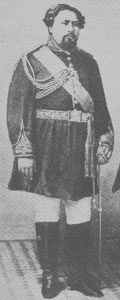Noe wale mai no ka nahele
Kipu ka ʻohu i ka mauna
I walea ʻo Aliʻiolani
I ke kui pua lei ʻohelo
Me ʻole wahine i ka nahele
ʻO ke hoa like ʻole no ia
E kohu ʻole ai nā lani

Lot Kapuaiwa,
Kamehameha
V
The forest is covered by
mist
A mist that encircles the
mountain
As Aliʻiolani effortlessly delights
in
Stringing a flower lei of
ʻohelo
Womanless in the forest
His friendship has no equal
All other chiefs do not
compare
Source: Kamehameha V: Lot Kapuaiwa by Rosalin Comeau, Kamehameha Schools Press, translated by Nathan Napoka - This is a name chant for Lot Kapuaiwa Kalanimakua Aliʻiolani Kalani Kapuapaikalaninui who ruled from 1863-1872, as Kamehameha V. Kapuaiwa means mysterious kapu or sacred one protected by supernatural powers. The son of High Chiefess Kinaʻu, and Chief Mataio Kekuanaoʻa, governor of Oʻahu, he was the grandson of Kamehameha I and hanai to Chief Hoapili of Lahaina & Princess Harriet Nahiʻenaʻena. His motto was "Onipaʻa": immovable, firm, steadfast or determined; he worked diligently for his people and kingdom and was described as the last great chief of the olden type, like his grandfather Kamehameha I. He opposed annexation to the US, and considered Americans uncivil to strangers based on a train incident in Washington D.C. where he and his brother, Kamehameha IV, encountered their first experience of racial discrimination. He supported Britain, the Episcopal religion, and laid the cornerstone for St. Andrew's Cathedral. Alarmed by the decimation of the native population by 60 %, (Hawaiians had no immunity to diseases brought in by foreigners), leprosy, first diagnosed 1840, became his major health concern. On Jan 6, 1866, after much soul-searching and in the best interest of his people, he signed into law the very unpopular establishment of the leprosy settlement at Kalaupapa. In 1873, Father Damien de Veuster, the Sacred Hearts Catholic priest came to minister to the outcasts of society. Ironically, the first nuns to volunteer their services to Kaluapapa were Episcopalian. A compassionate king, he made personal visits to victims of the natural disasters of 1868-69; the volcanic eruptions of Mauna Loa, the earthquakes that devastated Kaʻū, and the 40-50 ft tsunami that killed 80 people. He reviewed 800 cases, helped all, and cared for the orphans, giving them homes with his relatives, retainers or raising them on his private estates. He appealed to Kaiser Wilhelm I of Germany, who sent Henri Berger to organize the Royal Hawaiian Band, a gift of music from the king to his people. His summer home in Moanalua Gardens, where he held luaus and hula performances, was the site of the Prince Lot Hula Festival in July, that honors Lot, King Kamehameha V.